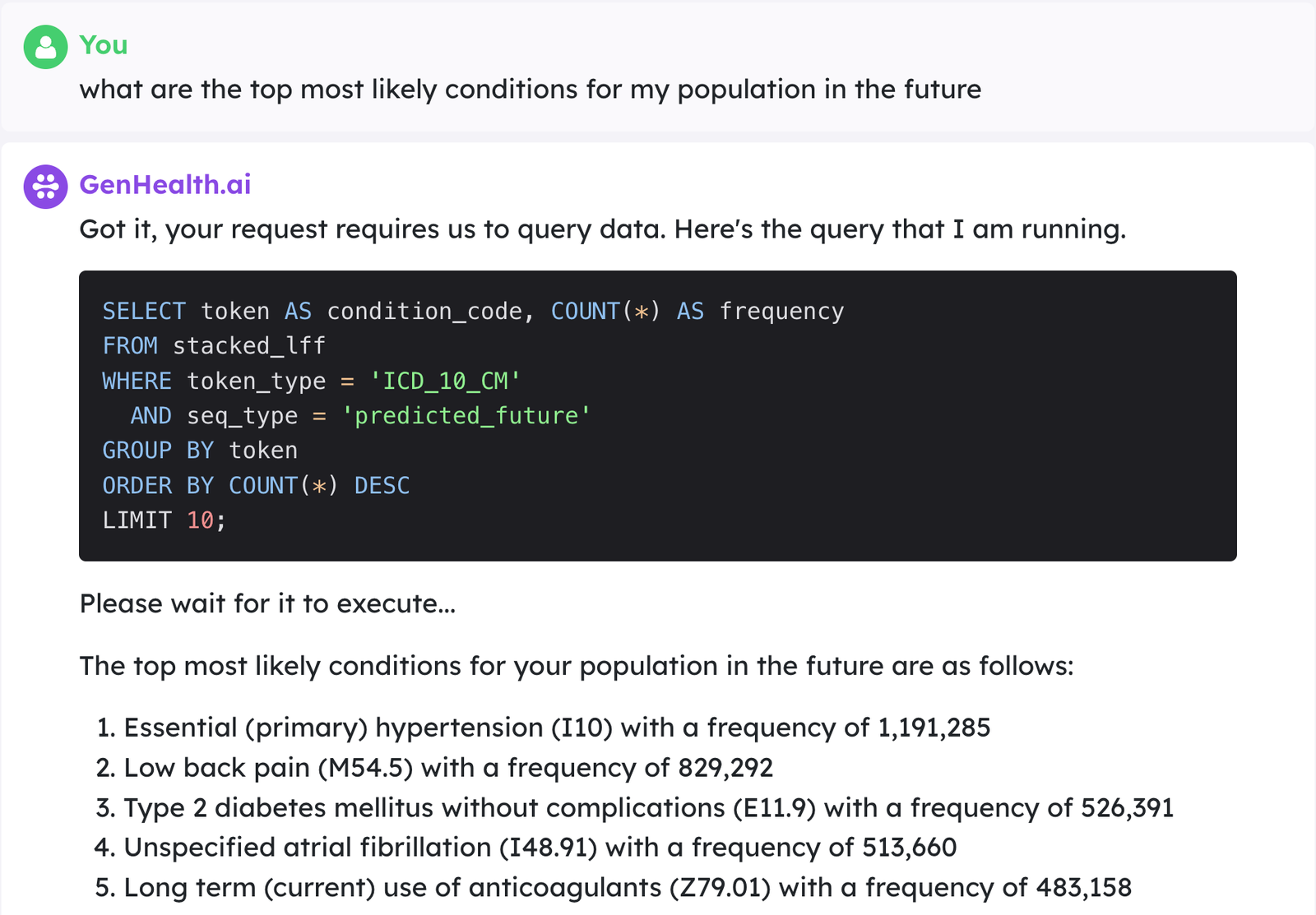The future of population health management analytics
AI Pop Health Analytics (G-Mode)
We introduce an entirely new way to interact with your healthcare data: past, present and FUTURE. G-Mode uses our own Large Medical Model trained on 140M patients to predict patient paths while making your population’s past and future data available via natural language.Find rising risk patients
Identify gaps in care
Stratify patients in seconds
Broaden analytic access
Chat with your data
No coding needed
Use natural language
Query future predictions
Learn More
Generative AI Powered Healthcare Analytics and Predictions
AI Data Ingest
- Extract structured patient data from all sources including faxes, HL7v2, C-CDA, FHIR and call centers transcripts
- Ingest claims and medical histories transformed into patient sequences
- Update daily or on change
By the brains that transformed 50M+ patients to FHIR
Large Medical Model
- The worlds first generative AI model built on patient histories
- 100M+ patients in the training set
- Predict patient risk and care pathways
- Simulate alternate potential futures to find the best potential path
Our model sets a new State of the Art in cost and risk prediciton
Structured Futures
- Patient histories and futures land in blazing fast database
- Each patient has a single history and multiple possible futures
- No need to build specific prediction models
- Interact with all past, present, and future data using SQL
Human readable PA logic explanations
Natural Language Interface
- No need to understand the data schema, SQL or Python
- Expand analytics reach
- Get early intervention ideas
- Generate individual risk assessments per patient
- Identify next best action for care management
Human readable PA logic explanations
Run analytics a 1000x faster
Super power data analytic teams with GenHealth's G-Mode. Data analytics teams will be able to use one model to support the majority of predictive use cases.Expand analytics reach to non technical members
Access to the model and outputs is surfaced through a natural language interface, so there is no need to write code or SQL.Predict future health events
Use GenHealth's Large Medical Model to generate optimal care pathway recommendations and next-best-action suggestions.Use GenHealth.ai's platform to get to know your data better than ever
G-Mode provides an interface that takes historical claims and clincal data, predicts individual patient futures and wraps that all up in a natural language interface. Your data analysts, care coordinators, and even providers can get answers in seconds without writing a single line of code. You've never been this powerful.Learn More

Simulate patient futures
LMM (patent pending) can generate future paths for a patient, condition, procedure, or their combinations. Aggregated paths can probabilistically shed light on a patient or population's journey.
cohort definition (patient history includes)
female
male
patients30
50
70
year oldwith
stroke
colon cancer
heart failure
undergoing a
physical
heart bypass
knee replacement
LMM (frequency of predictions over next year)
Risk calculation
LMM can calculate the risk for how quickly a disease progresses for a patient or population.
cohort definition (patient history includes)
Male patients who are 67 years old with obesity with a treatment plan starting with
metformin
gastric bypass surgery
liraglutide (semaglutide)
diet / exercise (counseling)
LMM (frequency of predictions over next year)
⬤ All other events⬤ Diabetic or Kidney events
Cost of care
LMM can identify futures impacted by medical decisions. The monetary impact of future events can be aggregated to understand the economics of a care decision.
cohort definition (patient history includes)
59 year old female with osteoarthritis for the hip who is
going in for a
physical
hip replacement
LMM (frequency of predictions over next year)
Quality measurement and readmissions
LMM can can calculate the quality of care via readmissions or other events indicative of positive healthcare outcomes.
cohort definition (patient history includes)
71 year old female patient with congestive heart failure and a treatment plan beginning with the following:
a primary care appointment
furosemide
angiotensin receptor blocker (losartan)
implantable cardiac defibrillator
LMM (frequency of predictions over next year)
